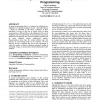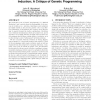96 search results - page 9 / 20 » Homologous Crossover in Genetic Programming |
GECCO
2005
Springer
14 years 7 days ago
2005
Springer
In genetic programming, there is a tendency for individuals in a population to accumulate fragments of code – often called introns – which are redundant in the fitness evaluat...
GECCO
2009
Springer
14 years 1 months ago
2009
Springer
We revisit the roots of Genetic Programming (i.e. Natural Evolution), and conclude that the mechanisms of the process of evolution (i.e. selection, inheritance and variation) are ...
GECCO
2009
Springer
14 years 1 months ago
2009
Springer
We describe a methodology for evolving Java bytecode, enabling the evolution of extant, unrestricted Java programs, or programs in other languages that compile to Java bytecode. B...
GECCO
2007
Springer
14 years 26 days ago
2007
Springer
Genetic Programming (GP) is an automated computational programming methodology, inspired by the workings of natural evolution techniques. It has been applied to solve complex prob...
GECCO
2011
Springer
12 years 10 months ago
2011
Springer
In genetic programming, the reproductive operators of crossover and mutation both require the selection of nodes from the reproducing individuals. Both unbiased random selection a...



